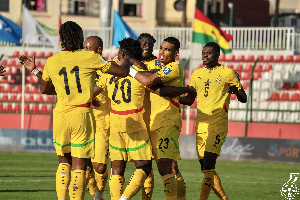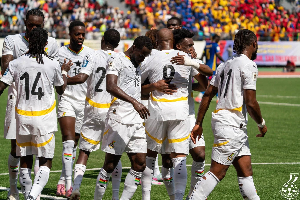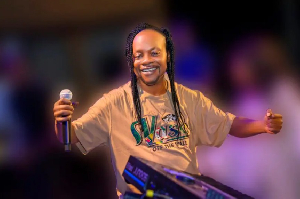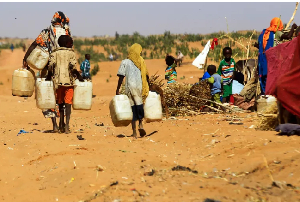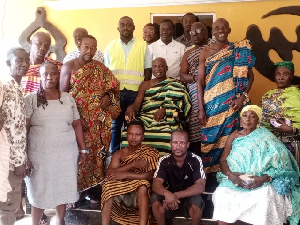Gabby Asare Otchere-Darko
I’d intended to critique President Mills’ ‘state of the nation address’ but was not so sure which part of the bacon to slice so went for a spot of foreign material that was at the very top, which reads: “Let me acknowledge our first President, Osagyefo Dr Kawme Nkrumah, that illustrious Founder of our nation. His selfless leadership serves as a point of reference in our determination to build a better Ghana. Incidentally, this year marks the 100th anniversary of Dr Nrkumah’s birth and a as country we should commemorate the event in an appropriate and befitting manner. Among others, we intend to honour Dr Nkrumah’s memory with a national holiday to be known as Founder’s Day and we will be presenting legislation to Parliament to this effect.”
In so doing, Prof Mills has found a ‘neat’ way to reward his own Nkrumaism but should this be done at the cost of a serious manipulation of history and disregard for Ghana’s true story? Should we do so by ignoring the collective sacrifices of the many who fought this fight before and then alongside Nkrumah? In short my answer is no: Ghana should be focusing on Founders’ Day rather than a Founder’s Day. Perhaps a minor change of syntax, but a major change to a day that would mark the joint contribution of our many nationalists, especially during the period when the fight for independence was most formalised, intense, collective and influential. There is a date that can honour all, including the CPP founder. A date that stands out in the history books as perhaps the real birth of the idea of an independent Ghana: August 4 1947.
The people who gathered that day at Saltpond to inaugurate the United Gold Coast Convention, the first true national nationalist party of the Gold Coast, included paramount chiefs, clergymen, lawyers, entrepreneurs, teachers, traders and “men and women from all walks of life in the Gold Coast”, according to a witness.
In the words of the chronicler, L H Ofosu-Appiah, August 4, 1947 “marked the beginning of a new era in the Gold Coast.”
It is a date that had immense meaning for those who gathered that day to champion the rights of our people and our nation. It is the date of a major political event, an event which shaped and determined the course of our collective history – rather than the personal birthday of one individual. In any case, Francis Kofi Nwiah Kwame Nkrumah did not even know his date of birth. To please form, Mr Nkrumah invented a birthday for himself: September 21, 1909.
On the other hand, 4 August 1947 was recognised by those present at the time as a defining moment in our history, and so it deserves to be recognised and commemorated by new generations of Ghanaians as the day their forebearers – not just one but many – joined together to create a better, brighter, independent future for their children and their children’s children.
Indeed, the formation of a structured nationalist movement for independence is said to have started when in February 1947, Dr Danquah paid a visit to George Alfred “Paa” Grant in Sekondi, a rich ship merchant who served on the Legislative Council under Governor Guggisberg. This led to a meeting with leading barristers F Awoonor-Wiliams, R S Blay and members of the Aborigines Rights Protection Society Messrs W E G Sekyi, George Moore and R S Wood, and members of the Gold Coast People’s League, including its Chairman Akufo-Addo and Secretary J W de Graft Johnson, who together joined hands with the chiefs to form a national movement.
What made this group national was that it was built to incorporate all the small nationalist movements of the time, including Obetsebi-Lamptey’s National League of the Gold Coast and J B’s Youth Conference. It was to be called the Gold Coast People’s Party, but William “Paa Wilie” Ofori Atta and his uncle Dr Danquah had other ideas, and went for the United Gold Coast Convention instead. Saltpond was a significant choice for a location because it was the headquarters of the Joint Provincial Council of chiefs and others. Paa Grant chaired the August 4 occasion and Dr Danquah delivered the inaugural address, which is Ghana’s version of the Declaration of Independence. Although the Declaration of Independence was made on July 4, 1776, it was not until 1787 that the American Constitution came to being. Yet, July 4 holds the kind of significance to Americans which August 4 should hold equally for Ghanaians. J B began his Saltpond address, “We have come from all the corners of this country, come to Saltpond for a specific purpose: for a decision. We have come to take a decision whether our country and people are any longer to tolerate a system of government under which those who are in control of government are not under the control of those who are governed… We must have, here and now, if we are to be governed, a new kind of freedom, a Gold Coast freedom, a Gold Coast liberty. We left our homes in Ghana and came down here to build for ourselves a new home. There is one thing we brought with us from ancient Ghana [870 years ago]. We brought with us our ancient freedom. Today the safety of that freedom is threatened, has been continuously threatened for a 100 years, since the Bond of 1844, and the time has come for a decision.”
The decision was dully taken on that date and that decision set in motion the train for independence until it came to a stop on March 6, 1957. Such a date, on which so many men and groups committed to the idea of self-rule came together, should be better considered as Founders’ Day rather than the fictional birthday of a man who undoubtedly played a very significant role in the founding of Ghana but who nevertheless cannot fairly be credited as the sole ‘Founder’ of Ghana.
Within the UGCC, you could connect every true nationalist of the period, from Nkrumah to others such as Dr de Graft Johnson, Koi Larbi, E A Armah, R P Baafour, R D Nelson, Laud Lartey, Quist-Therson, E O Lartsen, K Brakatu Ateko, Amabibie, E Quarcoo Tagoe, Enoch Mensah, Asuana Quartey, Molade Akiwumi, W M Q Halm, Oheneba Sakyi Djan and V B Annan. Other nationalists who contributed at the time can be added, including Nii Kwabena Bonner, and Osu Alata Mantse, who led the nationwide boycott of foreign goods.
Fellow of the Ghana Academy of Arts and Sciences, Professor Samuel Kingsley Botwe Asante, has argued that Dr Danquah and his colleague nationalists of the Gold Coast employed Pan-Africanism and regionalism long before Kwame Nkrumah returned to Ghana in December 1947.
Founders’ Day should also acknowledge the ex-servicemen procession of 28th February 1948 and the martyrdom of Sergeant Adjetey and Corporal Attipoe and Private Odartei Lamptey.
The direct link of the leaders of the UGCC to the events of 28 February cannot be overlooked by Prof Mills.
It was in the House of Akufo-Addo, Betty House, at a meeting of the working committee of the UGCC, including Nkrumah and Ako Adjei, that Dr Danquah sent a cablegram to the Secretary of State for the Colonies in the UK, calling for the recall of the Governor, the establishment of an interim government which the UGCC would run and a Constituent Assembly for new constitution for self-government, among other demands.
J B fired another telegram to the chiefs and people, Ghana’s version of the Gettysburg Address, declaring that “The Hour of Liberation Has Struck”, with the inspirational words, “Inheritors of Ghana’s ancient kingdom. My message as you see, is not moved by fear. Aggrey blotted fear from our dictionary. ‘Eagle fly for thou art not a chick!”
This led to the arrest of the men to be later named the Big Six: Danquah, Nkrumah, Ofori-Atta, Obetsebi-Lamptey, Akufo-Addo and Ako Adjei. It was their arrest after the riots that ignited the fire of nationalism among the peoples of the Gold Coast nationwide. But history has been most unfair to R S Blay and James Quist-Therson who were detained on 13 March 1948, two days later, and so missed by a tiny margin their rightful inclusion in the group marked by history as the leaders of our liberation struggle.
The Watson Commission was then set up to “enquire into and report on the recent disturbances in the Gold Coast and their underlying causes; and to make recommendations on any matter arising from their enquiry.” During its sittings, an unstoppable kind of nationalism gripped the nation. The Watson report led to the formation of the Constitutional Committee under Mr Justice J Henley Coussey. Its mandate was to “To examine the proposals for constitutional and political reform in paragraph 122 of the Report of the Commission of Inquiry into Disturbances on the Gold Coast, 1948, and due regard being paid to the views expressed on them by His Majesty’s Government and to consider the extend to which they can be accepted and the manner in which they can be implemented.” The independence train was fast on the move. The Convention People’s Party was launched in Accra on Sunday, 12th June, 1949 – almost two years after the UGCC. In the words of J B to Nkrumah, “the very name ‘United Gold Coast Convention’’ was devised by me and Willie, which you subsequently filched for the name of your party, Convention People’s Party.” Thus, to adopt the day of the inauguration of the UGCC, August 4, as Founders’ Day pays tribute to the CPP and its founder. Mr Nkrumah himself admits in the first page of his book ‘I Speak Freedom’ that there was “a considerable political awakening in the Gold Coast between 1919 and 1947” before he returned to Ghana.
Yet, as a hint of his own issues with according due credit to others, Nkrumah turned around to claim on page 53 of his other book ‘Dark Days in Ghana’, (1967) that it was he who launched the nucleus of the UGCC in Saltpond – but he shifts this monumental event by more than four months to December 29, 1947 to fit with his return to Ghana.
As Prof SKB Asante says: “Osagyefo perhaps unconsciously, makes the date of confirmation of his appointment as Secretary-General of the UGCC, which was December 29, 1947, appear to be the date on which the organization was actually launched.”
In the words of Prof Kwame Okoampa-Ahoofe, “Dr Danquah emerged into national spotlight during the mid-1920s, there was no formidably organised, broad-based political apparatus clamouring for the imminent overthrow of the British colonial regime. There had largely been ethnic groupings such as existed in Fanteland, mainly in the Cape Coast-Anomabu-Elmina district of the Gold Coast littoral, as well as several others in the central and northern halves of the country. It was Danquah who was to lead the United Gold Coast Convention (UGCC) to pose a systematic and formidable counter-force to British imperialism, from 1947 onwards.”
This, of course, is not to disregard the work of men like Ephraim Casely-Hayford nor to dismiss the role of Nkrumah. But as we continue to consolidate our democracy and seek to empower our people, we should guard against elevating one individual above all others, and instead recognise that our independence was won by a collective determination that brought together people across the Gold Coast.
So if we are to create a ‘Founders Day’ to mark the work of those who brought this about, it should commemorate a date which marks the efforts of all our founding nationalists rather than the birthday of just one – it should be a Founders’ Day, not a Founder’s Day.
This article first appeared in The Statesman of Monday 23, Feb. The author, Gabby Asare Otchere-Darko, is the Executive Director of the Danquah Institute.
Opinions of Tuesday, 30 November 1999
Columnist: Otchere-Darko, Gabby Asare


